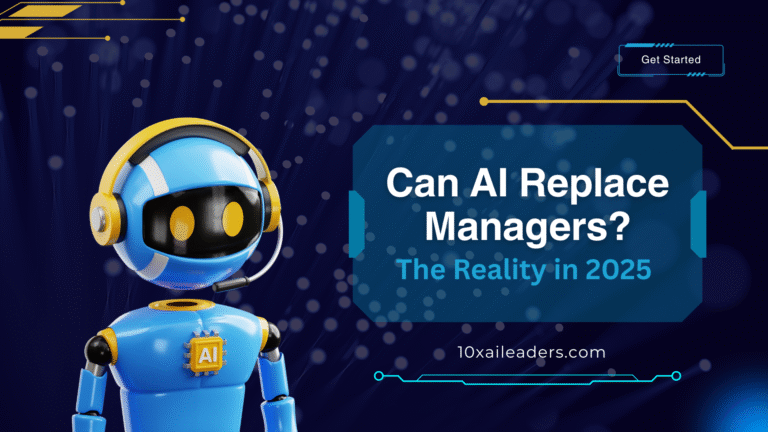The rapid rise of artificial intelligence has sparked debates across industries, and one question keeps coming up: Can AI replace managers? With algorithms now capable of scheduling tasks, analyzing performance, and even giving feedback, it’s easy to see why some fear that AI could soon make management roles redundant.
But the truth in 2025 is far more nuanced. While AI is transforming the way managers lead, it is not eliminating the need for human leadership. Instead, it’s reshaping managerial roles and expectations. For HR and L&D professionals, this distinction is critical—because the organizations that understand the partnership between AI and managers will outperform those that see it as a competition
What AI Can Do in Management Roles
AI is increasingly being integrated into managerial workflows. Here are areas where it delivers real value:
Performance Analytics: AI can quickly process employee performance data, highlight productivity trends, and suggest interventions.
Scheduling and Resource Allocation: Tools powered by AI optimize staff schedules, balance workloads, and forecast resource needs.
Employee Engagement Insights: By analyzing surveys, communication patterns, and sentiment, AI can identify risks like burnout or disengagement.
Decision Support: AI models provide leaders with predictive insights, helping them make faster, data-informed choices.
These capabilities make work more efficient and free managers from repetitive tasks. In fact, AI workshops and AI training programs now teach managers how to apply these tools strategically—turning data into action rather than drowning in reports.
What AI Cannot Replace
Despite its power, AI lacks core elements of leadership that make managers indispensable:
1. Human Empathy and Emotional Intelligence
AI can detect sentiment in communication, but it cannot truly understand the nuances of human emotion. Supporting an employee through personal struggles or motivating a team after setbacks requires compassion and emotional presence—something no algorithm can replicate.
2. Vision and Strategic Thinking
Managers provide context and long-term direction. While AI can optimize for efficiency, it cannot imagine new markets, craft bold strategies, or lead organizations through ambiguity.
3. Conflict Resolution and Trust-Building
AI may suggest conflict management techniques, but it cannot mediate disputes with the sensitivity, persuasion, and credibility a trusted leader brings. Teams thrive when they trust their managers—trust that comes from human connection.
4. Coaching and Career Development
Employees don’t just want task allocation—they want mentorship and growth. AI can recommend training modules, but only managers can coach, inspire, and adapt guidance to individual aspirations.

The Future Role of Managers with AI
Instead of replacing managers, AI is changing what great management looks like. Managers who embrace AI tools will:
Spend less time on admin, more on leadership. Automating reports and scheduling means more time for mentoring and strategic thinking.
Use AI insights to enhance decision-making. Data can inform—but not dictate—decisions, giving managers a sharper edge.
Lead hybrid and global teams effectively. AI-powered translation, scheduling, and collaboration tools will make managing diverse teams easier.
Act as AI champions. Managers will guide employees in adapting to AI tools, ensuring adoption is smooth and ethical.
This is why AI training for managers is becoming a top priority for L&D leaders. The goal isn’t to turn managers into data scientists but to help them build confidence in integrating AI responsibly.
Case Example: A Retail Manager Using AI
Consider a regional manager in retail. Without AI, much of their time goes into sales reporting, scheduling shifts, and monitoring performance. With AI:
Reports are automatically generated with actionable insights.
Scheduling software uses predictive analytics to align staffing with customer traffic.
AI identifies which employees are excelling and who may need coaching.
Instead of being bogged down in spreadsheets, the manager can now spend more time coaching store leaders, visiting key locations, and strategizing for seasonal trends. AI doesn’t replace the manager—it amplifies their impact.
Why HR and L&D Professionals Must Act Now
For HR leaders, the question isn’t whether AI will replace managers—it’s how to prepare managers to thrive with AI. This means:
Building AI literacy through structured training.
Offering AI workshops that show practical applications, not just theory.
Creating AI-friendly cultures where managers and employees feel empowered, not threatened.
Redesigning leadership development programs to include AI readiness as a core competency.
Organizations that invest in this shift will gain managers who are not only efficient but also more human, empathetic, and strategic than ever.
Conclusion
AI is transforming management—but not replacing it. The reality is that while AI can automate tasks and provide insights, the human side of leadership remains irreplaceable. Managers will continue to be the bridge between strategy and people, between data and empathy.
The leaders who succeed in 2025 will be those who embrace AI as a partner, not a rival. They will invest in AI workshops and AI training to sharpen their skills, guide their teams confidently, and create workplaces where technology and humanity work together.
If you’re ready to future-proof your leadership pipeline, now is the time to equip your managers with the knowledge and tools they need to thrive in the age of AI.
FAQs: Can AI Replace Managers?
Can AI fully replace managers in the workplace?
No. AI can automate tasks and support decisions, but managers are needed for empathy, coaching, and strategic leadership.
What is the role of AI training for managers?
AI training helps managers understand practical applications of AI, making them more effective leaders without needing technical expertise.
How can AI improve management efficiency?
AI automates repetitive tasks like scheduling and reporting, freeing managers to focus on people and strategy.
Do small businesses need AI managers?
Yes. Even small businesses benefit from AI tools for resource allocation, customer engagement, and performance management—if managers are trained to use them.
